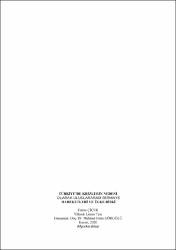Türkiye’de krizlerin nedeni olarak uluslararası sermaye hareketleri ve ülke riski
Özet
1980’li yıllar itibariyle başlayan finansal serbestleşme ülkelerin kalkınmalarını gerçekleştirebilmek için dış kaynaklara ihtiyaç duyması, kendi sermayelerini diğer ülkelerde daha karlı yatırımlara yönlendirmek istemeleri, gelişmiş ve gelişmekte olan ülkelerin aynı kanaatte olması bu sürece hız kazandırmıştır. Serbestleşme sürecinin olumlu ve olumsuz birçok sonucu olmuştur. Serbestleşme sürecinde ve sonrasında yaşananlar akademik çalışmalara konu olmuştur. Çalışmanın amacı Türkiye’de yaşanan krizlere doğrudan yabancı yatırımların ve ülke riskinin neden olup olmadığının araştırılmasıdır. Birinci bölümde kriz tanımı, çeşitleri iktisadi kuramlar çerçevesinde incelenmektedir. Finansal krizlerin nedenleri, alınabilecek önlemler, krizlerin sınıflandırılması ve finansal kriz modelleri araştırılmış olup Türkiye’de ve Dünya’da yaşanan krizlere değinilmiştir. İkinci bölümde genel manadaki risk tanımını ile risk çeşitlerine, ülke riski kavramına, önemine, tarihsel gelişimine, ülke riskinin kaynaklarına, ülke riskini belirleyen faktörlere, ülke riskinin ölçülmesinde kullanılacak metotlara ve bu riski ölçen kuruluşlara yer verilmiştir. Daha sonra ülke riskinin sonuçlarına ve ülke riski ile ilgili literatüre yer verilmiştir. Üçüncü bölümde döviz kuru oranı, ticari dışa açıklık, işsizlik oranı ve yolsuzluk algı endeksinin doğrudan yabancı yatırımlar üzerinde bir etkisinin olup olmadığı araştırılmıştır. Çalışmanın amacı doğrultusunda, Türkiye’ye yönelen doğrudan yabancı yatırımların seçilmiş makroekonomik değişkenler üzerindeki etkisi, 1995-2017 dönemini kapsayan yıllık veriler kullanılarak çoklu doğrusal regresyon analizi ile araştırılmıştır. Dördüncü bölümde doğrudan yabancı yatırımlar, portföy yatırımları, diğer yatırımlar, finansal risk, ekonomik risk, reel döviz kuru, işsizlik oranı ve toplam rezervlerin Türkiye’de yaşanan krizleri açıklayıcılığı araştırılmıştır. Çalışmanın amacı doğrultusunda, Türkiye’de yaşanan krizlerin seçilmiş makroekonomik değişkenler tarafından etkilenip etkilenmediği, 2002-2015 yılları arasındaki döneme ilişkin aylık veriler kullanılarak, Probit analizi ile araştırılmıştır. Değişkenlere ait marjinal etkiler analizi de yapılmıştır. Probit model sonuçlarına göre, doğrudan yabancı yatırımlar, ekonomik risk, portföy yatırımları, diğer yatırımları, finansal risk, döviz kuru ve uluslararası rezerv değişkenlerinin istatistiksel olarak anlamsız çıkmıştır. Buna karşılık işsizlik oranı değişkeni anlamlı ve önemli olarak elde edilmiştir. The financial liberalization which started in the 1980’s has speeded up the process for the nee d for foreign resources by the countries in order to realize their economic progress, the motive to direct their capital to more profitable investment fields, and the consensus on these issues in both developed and developing countries. There has been a number of positive and negative consequences of this process. These effects occupy a large place in the academic literature. The aim of this thesis is to investigate whether foreign direct investment and country risk (financial and economic risks), real exchange rates, unemployment rates and total reserves might be the reasons of the crises in Turkey. In the first chapter, definitions and types of crisis will be explained within the framework of economic theories. The reasons of financial crisis, measures to be taken, classification of crisis, models of crisis in Turkey and in the World will be evaluated in this chapter. In the second part, definitions and types of risk and country risk; historical evolution and importance of risk and country risk; sources and factors of country risk; methods and institutions to measure country risk will be stated; and literature survey has been made to clarify the country risk and its consequences. In the third section, it has been studied that whether exchange rate, trade openness, unemployment rate and corruption perception index have a direct effect on the foreing direct investment. In this respect, the impact of inflows of foreign direct investment on selected macroeconomic indicators, by using the annual data between 1995-2017 and the multiple linear regression method, has been analyzed. In the fourth chapter, foreign direct investment, portfolio investment, other types of invesment, financial risk, economic risk, real exchange rate, unemployment rate and total reserves have been investigated as the possible reasons of crises in Turkey. In line with the aim of the thesis, it has been analysed that whether the cirises in Turkey have been affected by the macroeconomic variables, by using Probit analysis and the monthly data for the period between 2002-2015. The analysis of marginal effects of the variables have also been made. According to the Probit model results, foreign direct investment, portfolio investment, other types of investments, financial risks, exchange rate variables and international reserve variables have been proven statistically insignificant. On the other hand, unemployment rate is found to be significant and important.
Bağlantı
https://hdl.handle.net/11630/9733Koleksiyonlar
- Yüksek Lisans Tezleri [1691]



















